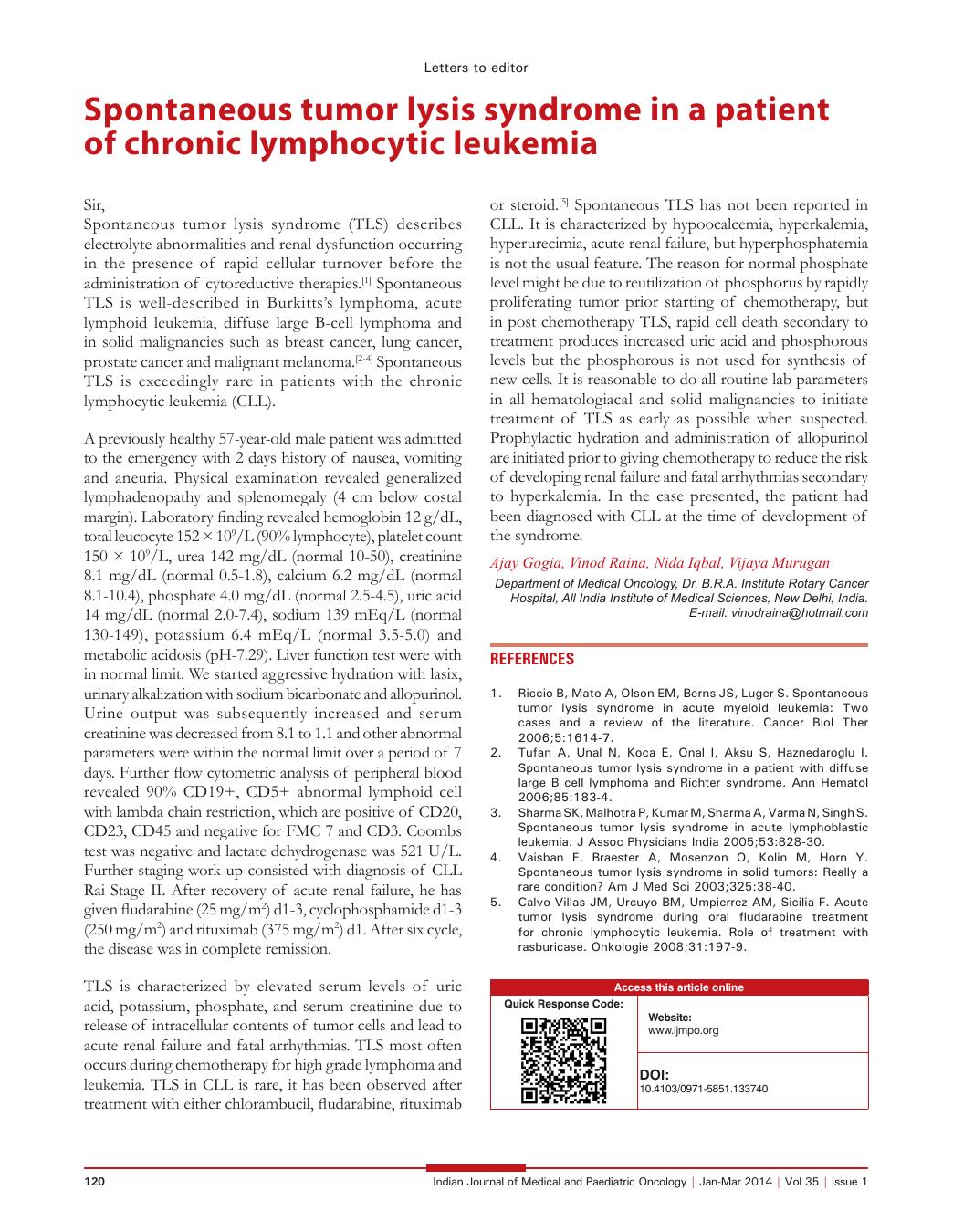Spontaneous tumor lysis syndrome in a patient of chronic lymphocytic leukemia
CC BY-NC-ND 4.0 · Indian J Med Paediatr Oncol 2014; 35(01): 120
DOI: DOI: 10.4103/0971-5851.133740

|
Publication History
Article published online:
19 July 2021
© 2014. Indian Society of Medical and Paediatric Oncology. This is an open access article published by Thieme under the terms of the Creative Commons Attribution-NonDerivative-NonCommercial-License, permitting copying and reproduction so long as the original work is given appropriate credit. Contents may not be used for commercial purposes, or adapted, remixed, transformed or built upon. (https://creativecommons.org/licenses/by-nc-nd/4.0/.)
Thieme Medical and Scientific Publishers Pvt. Ltd.
A-12, 2nd Floor, Sector 2, Noida-201301 UP, India
Sir,
Spontaneous tumor lysis syndrome (TLS) describes electrolyte abnormalities and renal dysfunction occurring in the presence of rapid cellular turnover before the administration of cytoreductive therapies.[1] Spontaneous TLS is well-described in Burkitts's lymphoma, acute lymphoid leukemia, diffuse large B-cell lymphoma and in solid malignancies such as breast cancer, lung cancer, prostate cancer and malignant melanoma.[2,3,4] Spontaneous TLS is exceedingly rare in patients with the chronic lymphocytic leukemia (CLL).
A previously healthy 57-year-old male patient was admitted to the emergency with 2 days history of nausea, vomiting and aneuria. Physical examination revealed generalized lymphadenopathy and splenomegaly (4 cm below costal margin). Laboratory finding revealed hemoglobin 12 g/dL, total leucocyte 152 × 109/L (90% lymphocyte), platelet count 150 × 109/L, urea 142 mg/dL (normal 10-50), creatinine 8.1 mg/dL (normal 0.5-1.8), calcium 6.2 mg/dL (normal 8.1-10.4), phosphate 4.0 mg/dL (normal 2.5-4.5), uric acid 14 mg/dL (normal 2.0-7.4), sodium 139 mEq/L (normal 130-149), potassium 6.4 mEq/L (normal 3.5-5.0) and metabolic acidosis (pH-7.29). Liver function test were with in normal limit. We started aggressive hydration with lasix, urinary alkalization with sodium bicarbonate and allopurinol. Urine output was subsequently increased and serum creatinine was decreased from 8.1 to 1.1 and other abnormal parameters were within the normal limit over a period of 7 days. Further flow cytometric analysis of peripheral blood revealed 90%-CD19+, CD5+ abnormal lymphoid cell with lambda chain restriction, which are positive of CD20, CD23, CD45 and negative for FMC 7 and CD3. Coombs test was negative and lactate dehydrogenase was 521 U/L. Further staging work-up consisted with diagnosis of CLL Rai Stage II. After recovery of acute renal failure, he has given fludarabine (25 mg/m2) d1-3, cyclophosphamide d1-3 (250 mg/m2) and rituximab (375 mg/m2) d1. After six cycle, the disease was in complete remission.
TLS is characterized by elevated serum levels of uric acid, potassium, phosphate, and serum creatinine due to release of intracellular contents of tumor cells and lead to acute renal failure and fatal arrhythmias. TLS most often occurs during chemotherapy for high grade lymphoma and leukemia. TLS in CLL is rare, it has been observed after treatment with either chlorambucil, fludarabine, rituximab or steroid.[5] Spontaneous TLS has not been reported in CLL. It is characterized by hypoocalcemia, hyperkalemia, hyperurecimia, acute renal failure, but hyperphosphatemia is not the usual feature. The reason for normal phosphate level might be due to reutilization of phosphorus by rapidly proliferating tumor prior starting of chemotherapy, but in post chemotherapy TLS, rapid cell death secondary to treatment produces increased uric acid and phosphorous levels but the phosphorous is not used for synthesis of new cells. It is reasonable to do all routine lab parameters in all hematologiacal and solid malignancies to initiate treatment of TLS as early as possible when suspected. Prophylactic hydration and administration of allopurinol are initiated prior to giving chemotherapy to reduce the risk of developing renal failure and fatal arrhythmias secondary to hyperkalemia. In the case presented, the patient had been diagnosed with CLL at the time of development of the syndrome.
References
- Riccio B, Mato A, Olson EM, Berns JS, Luger S. Spontaneous tumor lysis syndrome in acute myeloid leukemia: Two cases and a review of the literature. Cancer Biol Ther 2006;5:1614-7.
- Tufan A, Unal N, Koca E, Onal I, Aksu S, Haznedaroglu I. Spontaneous tumor lysis syndrome in a patient with diffuse large B cell lymphoma and Richter syndrome. Ann Hematol 2006;85:183-4.
- Sharma SK, Malhotra P, Kumar M, Sharma A, Varma N, Singh S. Spontaneous tumor lysis syndrome in acute lymphoblastic leukemia. J Assoc Physicians India 2005;53:828-30.
- Vaisban E, Braester A, Mosenzon O, Kolin M, Horn Y. Spontaneous tumor lysis syndrome in solid tumors: Really a rare condition? Am J Med Sci 2003;325:38-40.
- Calvo-Villas JM, Urcuyo BM, Umpierrez AM, Sicilia F. Acute tumor lysis syndrome during oral fludarabine treatment for chronic lymphocytic leukemia. Role of treatment with rasburicase. Onkologie 2008;31:197-9.
References
- Riccio B, Mato A, Olson EM, Berns JS, Luger S. Spontaneous tumor lysis syndrome in acute myeloid leukemia: Two cases and a review of the literature. Cancer Biol Ther 2006;5:1614-7.
- Tufan A, Unal N, Koca E, Onal I, Aksu S, Haznedaroglu I. Spontaneous tumor lysis syndrome in a patient with diffuse large B cell lymphoma and Richter syndrome. Ann Hematol 2006;85:183-4.
- Sharma SK, Malhotra P, Kumar M, Sharma A, Varma N, Singh S. Spontaneous tumor lysis syndrome in acute lymphoblastic leukemia. J Assoc Physicians India 2005;53:828-30.
- Vaisban E, Braester A, Mosenzon O, Kolin M, Horn Y. Spontaneous tumor lysis syndrome in solid tumors: Really a rare condition? Am J Med Sci 2003;325:38-40.
- Calvo-Villas JM, Urcuyo BM, Umpierrez AM, Sicilia F. Acute tumor lysis syndrome during oral fludarabine treatment for chronic lymphocytic leukemia. Role of treatment with rasburicase. Onkologie 2008;31:197-9.


 PDF
PDF  Views
Views  Share
Share

